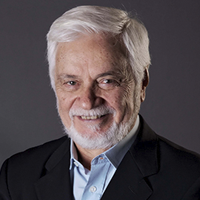Closed-door meetings
Trump: The Disruptor-Deadly of a World on the Brink of a Nervous Breakdown
- Institutional
July 24
On July 24, the Casa COP hosted a lecture by Ambassador Rubens Ricupero, Trustee Emeritus at CEBRI. Centered on the theme “Trump: The Chief Disruptor of a World on the Verge of a Nervous Breakdown,” the event featured opening remarks by Julia Dias Leite, CEO at CEBRI, and was moderated by economist Edmar Bacha, Trustee at CEBRI, Founding Partner and Director of the Institute for Economic Policy Studies/Casa das Garças.
In his remarks, Ambassador Ricupero examined the paradigm shift in United States foreign policy under the new Trump administration. According to him, this agenda positions the U.S. government as a catalyst for instability within an already fragile international order. It embodies a form of isolationism characterized by the “America First” slogan, involving disengagement from global commitments, a disregard for soft power, and indifference to core liberal order issues, such as climate change and human rights.
To interpret this policy direction, the Ambassador referenced the concept of “prioritization,” developed by Jennifer Lind and Daryl G. Press (2025), Associate Professors at Dartmouth College. According to this framework, the U.S., recognizing its strategic limitations, is concentrating its efforts on the geopolitical competition with China, thereby redefining its global role. For Ricupero, this strategy of prioritization provides a valuable lens through which to understand the apparent chaos as a potential pragmatic reorientation of U.S. foreign policy.
In the context of Brazil–United States bilateral relations, Ambassador Ricupero highlighted an unprecedented level of diplomatic estrangement between the two countries, describing it as an anomaly in a relationship that spans more than two centuries.
What explains this shift? And what are the implications for Brazil? These questions are addressed in a new Policy Paper by CEBRI, produced in partnership with the Konrad Adenauer Foundation and co-authored by Rubens Ricupero and Ariane Costa, Deputy Director for Geopolitics and International Trade. It is essential reading for anyone seeking to understand the direction of Brazilian foreign policy in the Trump 2.0 era.
Read the publication in full, HERE.


On July 24, the Casa COP hosted a lecture by Ambassador Rubens Ricupero, Trustee Emeritus at CEBRI. Centered on the theme “Trump: The Chief Disruptor of a World on the Verge of a Nervous Breakdown,” the event featured opening remarks by Julia Dias Leite, CEO at CEBRI, and was moderated by economist Edmar Bacha, Trustee at CEBRI, Founding Partner and Director of the Institute for Economic Policy Studies/Casa das Garças.
In his remarks, Ambassador Ricupero examined the paradigm shift in United States foreign policy under the new Trump administration. According to him, this agenda positions the U.S. government as a catalyst for instability within an already fragile international order. It embodies a form of isolationism characterized by the “America First” slogan, involving disengagement from global commitments, a disregard for soft power, and indifference to core liberal order issues, such as climate change and human rights.
To interpret this policy direction, the Ambassador referenced the concept of “prioritization,” developed by Jennifer Lind and Daryl G. Press (2025), Associate Professors at Dartmouth College. According to this framework, the U.S., recognizing its strategic limitations, is concentrating its efforts on the geopolitical competition with China, thereby redefining its global role. For Ricupero, this strategy of prioritization provides a valuable lens through which to understand the apparent chaos as a potential pragmatic reorientation of U.S. foreign policy.
In the context of Brazil–United States bilateral relations, Ambassador Ricupero highlighted an unprecedented level of diplomatic estrangement between the two countries, describing it as an anomaly in a relationship that spans more than two centuries.
What explains this shift? And what are the implications for Brazil? These questions are addressed in a new Policy Paper by CEBRI, produced in partnership with the Konrad Adenauer Foundation and co-authored by Rubens Ricupero and Ariane Costa, Deputy Director for Geopolitics and International Trade. It is essential reading for anyone seeking to understand the direction of Brazilian foreign policy in the Trump 2.0 era.
Read the publication in full, HERE.





66c8ab2f7b900.png)
